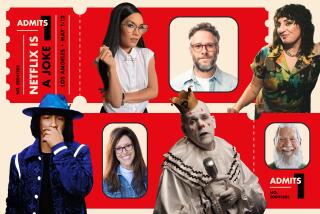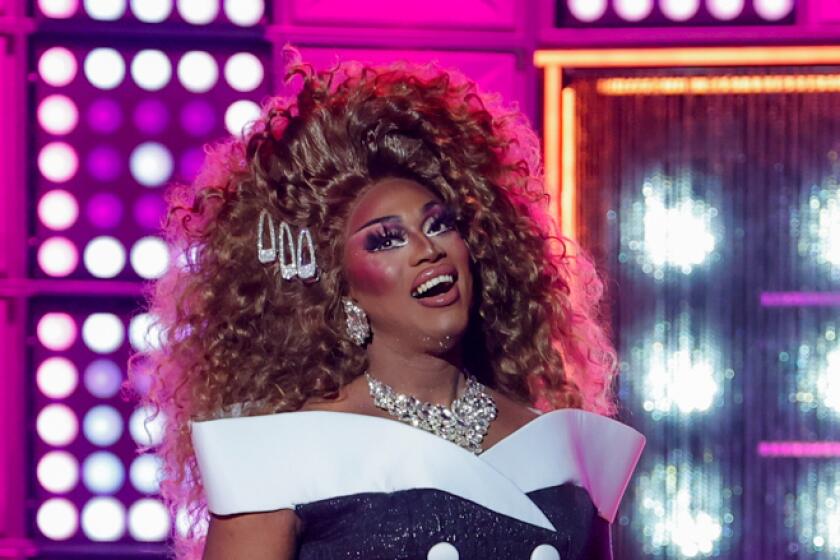Netflix, ‘House of Cards’ and the limits of binge-watching junk
The oddest thing about the hit Netflix political thriller “House of Cards” is that its popularity -- according to many media watchers and even to some extent Netflix itself -- seems inextricably tied up with the way it gets viewed, rather than whether it’s actually any good.
That’s probably fortunate for Netflix, because from the standpoint of the traditional hallmarks of quality in viewed entertainment -- coherent plotting, believable dialogue, professional acting -- this “House of Cards” is a pretty sorry spectacle.
Before we get into further detail about that question, let’s observe that most of the discussion of the series’ success does indeed focus on Netflix’s cunning in releasing the episodes of the series all at once, rather than in the traditional pattern of one a week. This, it seems, promotes “binge-watching” -- consuming the whole thing over, say, a single weekend -- and thereby creates “buzz.”
Buzz evidently is a big goal of media distribution companies like Netflix, HBO and Showtime. Whatever it is, Netflix seems to have it -- at least more at the moment than those other two distributors. The question, of course, is to what extent can you take buzz to the bank, and that’s unclear.
Rather, what’s unclear is whether Netflix’s financial results reflect the buzz of “House of Cards” or the success of its business model. Netflix is a stand-alone distributor -- you can subscribe to the service for $7.99 a month without signing up for a cable subscription (though you do need a broadband Internet connection, often from a cable company). For HBO, you have to invest in a cable subscription, which can start at $50 and rise very quickly from there.
So Netflix appeals to “cord-cutters,” or customers assembling their video entertainment from individual streams, including Hulu, Amazon Prime and other up-and-coming services. HBO, owned by Time Warner, plainly appeals to traditionalists who pay one bill to their cable company and treat Netflix-type services as add-ons.
In terms of financial results, Netflix and HBO both record about the same revenues -- in 2013, Netflix collected $4.4 billion, HBO $4.9 billion. But Netflix, burdened by content and technology costs, recorded an operating profit of only $228 million, while HBO, which is a more mature company and can share some costs with its cable partners and its corporate cousins, recorded $1.8 billion. (Time Warner broke out HBO’s results for the first time last year.)
As for their subscriber base, in the U.S. they appear to be running neck and neck at about 30 million each; that isn’t good news for HBO, which appears to be declining as Netflix gains. It’s a sign that HBO may be getting held back by its role as a cable-TV service. If that continues, expect to hear an end to HBO executives’ consistent claim that they’re happy to be a cable offering.
That brings us to the question of how much the quality of their respective offerings affects their business success. HBO has had a long history of popular, quality television series -- “The Sopranos,” “The Wire,” “Game of Thrones” among them. Netflix is an ambitious newcomer with hits and misses.
But what’s curious is how often the style of viewing Netflix’s signature hit, “House of Cards,” is treated by critics as an antidote to its poor quality. For example, Willa Paskin of Slate posits that the show is “designed to be binge-watched, by which I mean consumed so quickly there is no time to taste all the garbage we are guzzling down.... Apportioned out every week, dissected for plausibility, judged on execution, ‘House of Cards’ would barely be worth your time.”
That’s some recommendation.
But is “House of Cards” garbage? Judged against its forebear, the 1990s British trilogy starring the incomparable Ian Richardson as a conniving parliamentary whip turned prime minister, yes. Richardson’s Francis Urquhart is a cannier operator than Kevin Spacey’s Francis Underwood. The acting is subtler, the dialogue cracklier.
Unlike the British series, the U.S. “House of Cards” reads as fake from beginning to end -- political maneuvering that could never imaginably happen in real life, reporters who wouldn’t last a day on the job, lines that would never be spoken even as jokes.
This may reflect cowardice on the part of the U.S. producers, who are afraid that if they depicted realistic conniving, they’d insult powerful forces in Washington. But it may be why so much of the audience of “House of Cards,” in Washington and elsewhere, seems to be hate-watching the show, reveling in its sheer implausibility. As Seth Masket, a University of Denver political scientist, wrote of one plot development in Series 1 last year: “The main problem is that Underwood’s bluff would not have been remotely believable in real life.”
Sorry, but I require even my more fanciful thrillers to have a core of verisimilitude. “House of Cards” is so sloppy it violates most of the rules of artistic creation Mark Twain outlined in his classic essay, “Fenimore Cooper’s Literary Offenses.”
Among them: “The personages in a tale shall be alive, except in the case of corpses, and that always the reader shall be able to tell the corpses from the others.” And: “When the personages of a tale deal in conversation, the talk shall sound like human talk, and be talk such as human beings would be likely to talk in the given circumstances, and have a discoverable meaning.” And most of all: “Crass stupidities shall not be played upon the reader as ‘the craft of the woodsman, the delicate art of the forest.’” (Or in this case, ‘the craft of the politician” etc.)
The risk of offering a substandard product via a hot new technology is that it’s not very hard for competitors to match your technology. If the video market continues to develop along its current trendline, HBO may start to make itself available as a streaming service, and Netflix’s technological advantage will evaporate. And if Netflix deceives itself into thinking that “House of Cards” was popular because it was good, rather than because it was accessible in a unique new way, it may find itself holding a deck full of jokers.
More to Read
The biggest entertainment stories
Get our big stories about Hollywood, film, television, music, arts, culture and more right in your inbox as soon as they publish.
You may occasionally receive promotional content from the Los Angeles Times.







